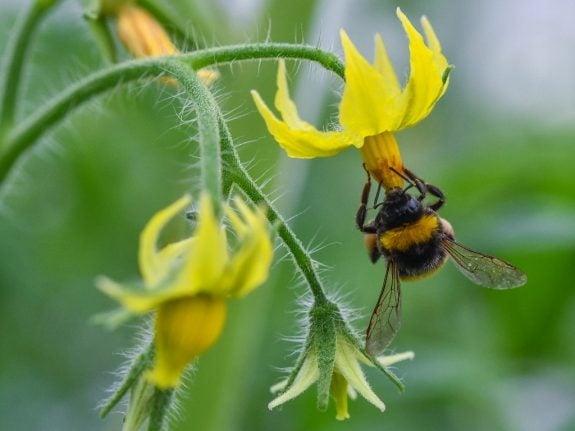Experts warn that ordinary people’s gardens in France can be full of toxic plants and that people need to be aware of what to watch out for.
Children in particular should be warned that some of those lovely looking plants in the garden are best avoided.
If someone does accidentally consume the wrong plant and is feeling unwell, expert advice should be sought from a doctor or by calling one of the “Centres Anti-poison” that are located in big French cities.
(The full list of these centres is here: www.centres-antipoison.net)
Here are some of the plants commonly found which can seriously damage your health:
Hemlock Water Dropwort
This is what may have killed the man in Nantes. They like marshy soil and look like celery with roots that resemble a bunch of carrots. Cattle can safely eat their leaves but their roots are highly poisonous, and a cow can die having consumed just one root.
 Hemlock Water Dropwort. Photo: Wikicommons
Hemlock Water Dropwort. Photo: Wikicommons
Tomato
Yes, the familiar tomato can be a toxic plant. Obviously not the red fruity bits of the plant but the green stalks and leaves which can cause stomach ache or intestinal damage.
 Tomato plant. Photo: AFP
Tomato plant. Photo: AFP
Arum lily
This plant, with its pointed green leaves and white flowers, is a delight for the eye but a disaster for the stomach. When consumed, it can cause a burning sensation in the mouth, throat, lips and tongue, choking and swelling of the throat, and difficulty in swallowing.
 Arum Lily. Photo: Wikicommons
Arum Lily. Photo: Wikicommons
Cherry laurel
A vigorous shrub often used to provide screening. Its leaves and fruit pips can, if chewed, release cyanide and benzaldehyde. It must not be confused with bay leaves, which of course are useful for cooking.
 Cherry Laurel. Photo: Tomwsulcer/Wikicommons
Cherry Laurel. Photo: Tomwsulcer/Wikicommons
Hemlock (or poison hemlock)
 Hemlock. Photo: Wendell Smith/Wikicommons
Hemlock. Photo: Wendell Smith/Wikicommons


 Please whitelist us to continue reading.
Please whitelist us to continue reading.
Member comments